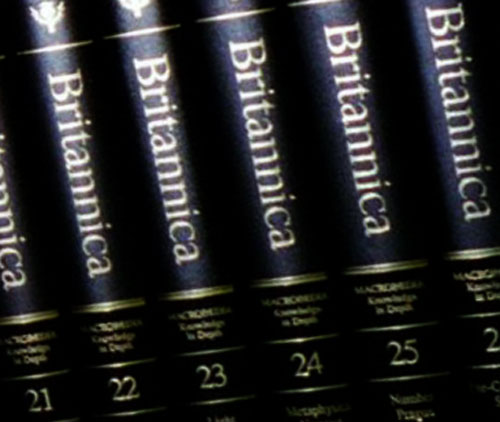
So round, so firm, so fully packed.
Encyclopedia Britannica, I’m going to miss you.
I’ll never forget those long, hot afternoons of my adolescence, huddled with you in the college library, dripping sweat onto overdue term papers, struggling to find words that could compare to yours (but stopping before things got out of hand and I lost a letter grade due to plagiarism.) World Book, Encyclopedia Americana, they just didn’t compare. They didn’t have the heft, the smooth pages bound so seductively in leather and gold, the splashes of tropical color in the sections on Argentina, on Birds, on Cheese. Studying without you has never been the same.
Encyclopedia Britannica’s 2010 edition, coming out this year, will be the last to appear in print. They will continue to provide an online subscription-only encyclopedia, and what has become their primary business, educational materials for schools, will be unaffected, but what for many of us was the pinnacle of publishing will no longer be produced.
When I was growing up, not having an encyclopedia in the house indicated that you weren’t serious about educating your children. Even if the only other reading material in the place were the Bible and copies of the Progressive Farmer magazine, that row of expensively printed and bound volumes was a badge of commitment to making the world a better place. In my house we had the World Book: I appreciated it, but I knew that it was a Ford Pickup compared to the Britannica’s Rolls-Royce. World Book could help you with the heavy lifting, but you put on a clean shirt to consult Britannica.
Even the name: Encyclopedia Britannica. You felt like you were halfway to medical school just saying it out loud.
I don’t regret the rise of Wikipedia and other online information sources. After a bumpy start, the online encyclopedia has been able to maintain a level of accuracy that is almost on a par with that of its printed competitors, and the ability to provide information that is always up to date (remember trying to track down Belgian Congo/Zaire/Democratic Republic of the Congo? if you had the wrong year, you had the wrong country) is invaluable in a world that changes as we watch. Also, cost was always a factor with the print encyclopedias, and Britannica was expensive. A full set of Encyclopedia Britannica would have cost almost ten percent of the sale price of the house I grew up in. Britannica appeared in the local community college library (an edition that had been printed when my mother was in elementary school) but rarely in homes in Boaz, Alabama.
The word “encyclopedia” is actually thought to be a mistake: In the 16th century Renaissance scholars read the Greek phrase “enkyklios paideia” to mean “general education”. A more accurate translation is “traning in a circle”, meaning the circle of the arts and sciences, and referred to the educational requirement of child-rearing. The French were the first to publish a compendium of knowledge, with entries arranged in alphabetical order, in the 17th century.1
Still, I think it’s a shame that schoolchildren of the future are not going to have the experience of the encyclopedia: learning how not to find things, learning how to get lost somewhere between Tarragon and Transportation just looking at the pictures, reading the names. It’s hard to get drawn off the track in Wikipedia, it’s just too easy to use, too direct. Today’s third-grader will never go looking for Monkfish and find himself prowling the streets of Montevideo, get sidetracked into the labyrinthine corridors of the Potala, foggy with incense, when what he was looking for was Potassium.
Oh well, time marches on, all things change, and old relationships must give way to new. But, Britannica, you’ll always have a place in my heart: I’ll always remember you for those three little words, three words that came to mean so much to me:
“Look it up.”
. . .



Leave a Reply